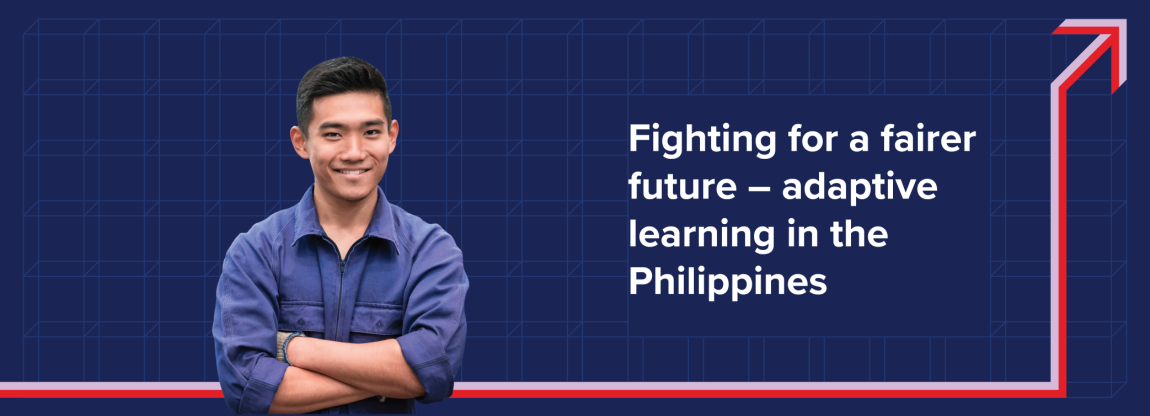Fighting for a fairer future – adaptive learning in the Philippines
The Philippines has the fastest growing economy in South-East Asia, with GDP growth levels at more than 7% for much of 2022. Although still classed as an ‘emerging economy’, Filipino investment in infrastructure, digitalisation and education has allowed them to make rapid progress.
Yet, while their economic growth is testament to the success of their efforts designed to build the country’s economy, there’s still some way to go. Whilst the GDP for the Philippines may be higher than that of their neighbours, the issue of digitalisation—or lack of—is still an integral one. Indeed, as recently as 2020, estimates show that under 20% of Filipino households have internet access.
The issues of societal growth and internet access were thrown into sharp focus when the Filipino education system was forced to deal with the challenges of the Covid 19 pandemic. Our recent case study provides a detailed insight into how educators there worked with McGraw Hill to transition to online learning systems at Far Eastern University (FEU) in Manila.
Remote learning in an emerging economy
The staff and students at FEU were already incorporating online learning into their curriculum before the pandemic. Consequently, adapting to lockdown teaching and learning solutions were perhaps less of a challenge for FEU than other schools and colleges.
Nevertheless, issues of equity and access became immediately apparent. In the case study, math teacher Vincent Vaso acknowledges the benefits of McGraw Hill’s online learning platform, ALEKS, without shying away from some of the problems faced by his students in an ‘extra-remote’ learning environment.
“There’s a big difference between having ALEKS and not having ALEKS. The way that it guides you…it’s very, very beneficial."
“But sometimes, the hardest part as teachers is having to remind our students to use ALEKS, even though we’re aware that some of them live in far-flung areas where the internet is very hard to access.”
“Some of them are using cellphones, with unreliable data connection. For those in marginalised areas it can be really hard to provide sufficient support.”
It fell to school leaders like Alma Vicentina Dela Cruz, FEU Roosevelt’s Senior Vice-President, to introduce policy changes that tackled equity issues like internet access.
“It’s a common challenge in the Philippines. To overcome it, we opened the school for the students with unreliable internet access, so they could come in at additional times and connect to the internet.”
However, the teachers found that many of the features of McGraw Hill’s learning platforms could be used to offset effects felt by students who were facing additional challenges.
No student left behind, with adaptive learning tools
Biology teacher Grace Nezortado describes how McGraw Hill’s Connect automatically differentiates learning exercises using ‘SmartBook’, an adaptive tool that assesses and responds to each student’s areas for development.
“With SmartBook, if the student doesn’t understand a concept, it can be measured, and guided questions will keep returning to the concept until a student has fully understood it. A further recommendation pops up once the student’s completed an activity. These are very helpful, letting the student know their accuracy, and which concepts have challenged them most.”
A common theme among these case studies is the amount of time teachers save on tasks like marking work or creating resources. Tools like Connect and ALEKS absorb a lot of this labour, allowing teachers to devote more time and energy to the students who need the most help.
Digital solutions that can build ‘high-end’ skills
One of the key issues facing the Filipino education system, as identified by the World Bank in 2012, was the lack of ‘high-end’ skills that would allow the Philippines to compete in an era of knowledge-based economies.
Developing critical thinking, problem solving and creativity skills has consequently been a strong focus for improvement at every level of the Filipino education system. Having the right tools to tackle the problem (and measure the results) is vital.
FEU High teacher Lorivi Sarvida talks about how Connect’s ‘Power Of Process’ tools allows her students to develop specific high-end literacy skills, such as drawing inference or responding to an argument. With Power of Process, this development is measurable and systematised in a way that allows students to understand where and how they can improve.
While the pandemic has served to accelerate the digitalisation of the Philippines, the difficulties of harnessing the country’s education system to serve the economy remain as complex as ever. Sophisticated individualised learning systems like Connect and ALEKS provide Filipino teachers with a strong set of tools to help manage these challenges, as this case study shows.
You can read more about FEU’s digital journey here.

